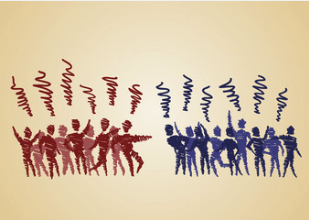Political intolerance must be nipped in the bud if Zimbabwe is to develop into a multi-party democracy.
This came out of a discussion on ‘This Morning on Asakhe’ a CITE Twitter Spaces current affairs programme where participants were debating on whether there is room for multi-party democracy in Zimbabwe.
The country has seen new political parties mushrooming ahead of the 2023 polls with the multiplicity of political parties and the plurality of political ideas seen as an indication of democracy.
The latest political party to enter the political fray, the Democratic Union of Zimbabwe (DUZ) has been dismissed by some political players as a Zanu PF project.
Political analyst, Effie Ncube said there is a need to emulate multi-party democracy happening across the world
“We have to emphasise that all our leaders must speak peace, once you say somebody is a project of the opposition, you are labelling them and marking them for violent retribution from your own supporters, there is that danger and thus what we have seen from Zanu-PF, that once you start labelling people, it goes out of hand, it goes out of control and you find people being victimised on the ground on the basis of what you said,” he said.
Ncube said as much as people want their own leaders to win, there is a need to market them in a way that does not create friction on the ground.
“All this is a product of ZANU-PF there is no denial in that, the labelling of sell outs, western agents, this is a product of Zanu-PF that we are just duplicating that the opposition has just also amplified,” he said.
Another participant, Thabani Sibanda said the biggest challenge is that the understanding of democracy is based entirely on Zanu-PF.
“Our big problem is that we have learnt everything from Zanu-PF, we are apprentices of Zanu (PF), the intolerance and everything that happens is what we learnt from Zanu (PF), our knowledge and understanding of democracy is based entirely on what Zanu (PF) taught us and how they have conducted themselves including this idea that a person who is not with me is against me,” said Thabani.
He added that it was unfortunate that even opposition political leaders had adopted a similar stance.
“This is the problem that continues to this day, and the most unfortunate thing in it is that even the leaders in these parties, the ones that are called the big parties will basically seat and watch and say nothing to their supporters when the supporters show the Zanu-PF levels of intolerance and this is the problem, yes it suits them when new players in the politics are called projects of Zanu-PF and that kind of generates the excitement that they are the real deal in town but it’s terrible leadership because they are basically showing the same traits of Mugabe that we used to see where he basically saw every person who was opposed to him as working for the enemy,” said Thabani.
In addition, another speaker Thandazani said the two major political parties were out to maintain their dominance in the political arena.
“They exist to maintain their positions either as the main opposition or the main ruling party without allowing anyone else to come in with a clear objective that may as well begin to convince the suffering masses of our people in Zimbabwe,’ he said.
“Robert Chapman is called the light Obama, American project by those in the ruling elite and on the other hand you see those in the opposition as well thwarting his very same democratic space instead of them to stand in solidarity with each other and basically find a way of coming up with a coalition or something else, they even call him a ZANU-PF project.”
He said there is no room for multi-party democracy in Zimbabwe despite it being guaranteed in the constitution.
“Yes the constitution allows that, it is on the paper but in reality, if you come as a third force you get attacks from both sides, hence I am saying both sides are actually fighting to maintain their status,” he said.

